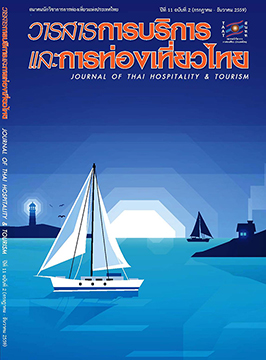The Development of Agro-tourism Learning Route : A Case Study of Tumbon Khlongkhuean, Chachoengsao Province
Main Article Content
Abstract
The objective of this study was to develop Tumbon Khlongkhuean’s agro-tourism learning route. The process in the study involves both qualitative and quantitative research methods with participatory action research based on the data conducted through tourism resource audit sheet, interview and questionnaire. The outcome of research revealed that Tumbon Khlongkhuean is rich of beautiful attraction, cultural and agricultural products to promote as agro-tourism destination. The studies of tourist’s behavior and opinion found they are interested to learn about the royal projects, to enjoy the beauty of nature and atmosphere of agro-tourism destination, to learn the orchard and agriculture combined orchards and learning from centre of agriculture knowledge transfer. The result of Tumbon Khlongkhuean’s agro-tourism learning route development revealed that the most appropriate of agro-tourism learning routes is an accommodation, followed by the ability to transfer the knowledge of the orchard owners, and the adequacy of orchards and farms, whilst the clarity of direction signs lasts in the average minimum from all above.
Article Details
References
[2] Bullkul, Chok. (2013). Understand the Way of “Green Agriculture” by Traveling to Chokchai Farm. Journal of Business Administration, Economics and Communication, 8(1), 14.
[3] Chachoengsao Governor's Office. (2015). Chachoengsao Province Development Plan (2014-2017). Retrieved February 10, 2015, from https://www.province.chachoengsao.go.th
[4] Chatkul, Nisa. (2007). Tourism Industry. Bangkok: Chulalongkorn Press.
[5] Chemnasiri, Nartsuda. (2013). The Community Potential Development for Sustainable Agro-tourism: Case Study for Phuket and Chonburi province. Chankasem Journal, 19(36), 41-50.
[6] Chittungwattana, Boonlert. & Sukleang, Phusawat. (2006). Tour Organizing and Tour Program for Upper-Northern of Thailand. Bangkok: Place and Design.
[7] Chittungwattana, Boonlert. (2012).Tour Business. Bangkok: Thammasarn.
[8] Chotiviriyawanit, Artit., Hmankeb, Panya., & Limangkul, Tippawan. (2013). Participatory Community-Based Tourism Management of Luangprot-Thanlium Community, Ladkrabang District, Bangkok. King Mongkut’s Agricultural Journal, 31(2), 47-57.
[9] Cochran, W. G. (1997). Sampling Techniques. (3rded). New York: John Wiley &Sons.
[10] Esichaikul, Ranee. (2003). The Fundamental Knowledge about Tourism - Distant Study Hands-on The Sustainable Management of Community Tourism. Nontaburi: Sukothaithammathirat.
[11] Hirankitti, Pimpa., Sayapunt, Udom., Yaibuakrin, Kayoon., Inkeaw, Supunnee., & Hirankiiit, Somchai. (2013). Agro-Tourism Behavior of Thai Tourist. Suthiparithat Journal, 28(88), 363-383.
[12] Khansri, Sukhumaporn., & Kullachai, Peerachai. (2006). The Influencing Factors and Satisfaction on Agro-Tourism for Tourists. Retrieved October 18, 2013, from https://kucon.lib.ku.ac.th
[13] King Mongkut's Institute of Technology Ladkrabang. (2013). Agro-tourism. Retrieved September 9, 2013, from https://www.kmitl.ac.th
[14] Kline, C., Cardenas, D., Leung, Y. F., & Sanders, S. (2007). Sustainable Farm Tourism: Understanding and Managing Environmental Impacts of Visitor Activities. Journal of Extension, 45(2).
[15] Leiper, N. (1995). Tourism Management. Victoria: RMIT Press.
[16] Maraphot, Khanchit. (2012). The Development of Tour Packages in Respond to Demand Behavior of Thai Tourists: The Case Study of Chachoengsao province. Chachoengsao: Rajabhat Rajanagarindra University.
[17] Maraphot, Khanchit., & Roonpraphan, Chutima. (2014). The Guideline of the Sustainable Development in the Potential of Agro-tourism in Benja Burapa Suvarnabhumi Cluster, Thailand. Chachoengsao: Rajabhat Rajanagarindra University.
[18] McGehee, N.G. (2007). An Agritourism Systems Model: A Weberian Perspective. Journal of Sustainable Tourism, 15(2), 111-124.
[19] Meechai, Chutamat. (2014). The Development of Agriculture to Agro-Tourism: A Case Study of Agricultural in Taphong District, Muang, Rayong Province. Journal of Politics Administration and Law, 6(3), 427-440.
[20] Mill, R.C. (1990). Tourism the International Business. New Jersey: Prentice Hall.
[21] Ministry of Tourism and Sport promote Agro-tourism. (2015). Prachachat Business, 38, 22.
[22] Ministry of Tourism and Sport. (2011). National Tourism Development Plan 2012-2016. Retrieved December 13, 2014, from https://www.mots.go.th/ewt_dl_link.php?nid=4147
[23] Phawandee, Souwaluk. (2009). Agro-Tourism Management: A Case Study of Dongbang Herbal Agricultural Village, Dongkeelek, Muang, Prachinburi Province. Journal of Rajanagarindra, 6(16), 46-54.
[24] Rojrungsaj, Pimrawee. (2010). Community Tourism. Bangkok: Odeon Store.
[25] Sarobol, Sin., Wongtubtim, Udorn., Thongponwanit, Supawinee., Wongkum, Benchawan., & Natpunyoyai, Anongnart. (2013). Community-Based Tourism: The Concept and Experience Northern Area. Chiangmai: Wanida.
[26] Siamturakij. (2015)."Padriew Mango" Full-Orders "Japan-Korea" Reserve for Export. Retrieved January 8, 2015, from https://www.siamturakij.com/main/news_content.php?nt=4&nid=864
[27] Srinakharinwirot University. (2012). Guidelines for the Promotion and Tourism Development of the Province under the Project "Miracle of 8". Chachoengsao: Office of Tourism and Sport.
[28] Su-angkawatin, Pongpichan. (2015). The Development Guidelines for Destination Attraction and Tourism Activities of Li Jiang, The Celestial Dragon Village in Suphanburi Province. Journal of Thai Hospitality and Tourism. 10(1), 59-70.
[29] Sukpatch, Kassara., & Madhyamapurush, Warach. (2012). A Development Education-tourism Route for Aging Tourist, Case Study the Area of Electricity Generating Authority of Thailand, Maemoh Lampang. Retrieved January 24, 2015, from https://tar.thailis.or.th
[30] Thaklaewphan, Chuthamat., Sirithanawong, Bunyut., Prathoomta, Nawarat., Dangcham, Siriwan., Maksiri, Wanida., & Changadvach, Thipsuda. (2007). Local Agro-Tourism Trail Planning: Case Study in Ban Laem, Phetchaburi. Bangkok: National Research Council of Thailand.
[31] Tourism Authority of Thailand. (2015). Chachoengsao Mango Orchard. Retrieved January 3, 2015, from https://thai.tourismthailand.org
[32] Waiwanitkul, Narasri., & Udomsri, Chusak. (1997). Research Methodology in Business. (7th ed). Bangkok: Chulalongkorn Press.
[33] Wongrattana, Chusri. (2012). Statistical Techniques for Research. Bangkok: Taineramitkij Interprogressive Press.
[34] Wongtanawasu, Supwattanakorn., & Kumnuansil, Perasit. (2007). Basic Statistic for Local Research. Bangkok: Expernet.
[35] Wongwiipak, Chanun., Leartrit, Swang., Kahakitkoson, Amornchai., & Boonruang, Luk. (2004). Cultural Resource Management for Sustainable Tourism. Nakornpatom: Silpakorn University Press.


